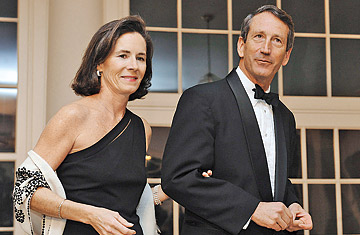
South Carolina Governor Mark Sanford arrives with his wife Jenny at a White House dinner held by President Obama for the National Governors Association on Feb. 22, 2009
(6 of 7)
Lying on the floor, drifting in and out of consciousness, I would gaze up at her and feel strangely comforted, the way you do around a certain kind of bossy, sexless power mom. The show approximated family life exactly: it was mostly good-natured and often boring and centered on the most basic transactions of daily existence--getting everybody dressed and fed, cleaning up, keeping quarrels to a simmer, not a boil. Now and then--in moments that genuinely did seem unscripted--Kate would wilt, leaning against the kitchen counter with a cup of coffee and seeming, for the twinkling of an eye, as though she were allowing herself to absorb the shock of it all. But then she would shake it off, plow forward, harass Jon into making himself a lower-calorie lunch and go back to wiping down the counters and giving orders.
Even though it was gimmick-filled reality television, there seemed to be a bit of actual--even profound--truth in it. The underlying premise was that Jon and Kate Gosselin's marriage was an enterprise dedicated not to making themselves happy but to taking care of the cavalcade of children they had produced, that they were laboring at something more significant than their own pleasure.
I got well, I went home, and I pretty much forgot about Jon and Kate until a few weeks ago, when they catapulted to the forefront of trash culture because they were--according to the tabloids--separated. I assumed it was a rumor, but it turned out to be true. Jon had gotten bored with being bossed around by Kate, he'd had a fling with a 23-year-old teacher, and the couple had filed for divorce. He still loved the kids, he said--with complete guilelessness, as though loving the kids and doing right by them were unrelated events: "I have a new chapter in my life. I'm only 32 years old. I really don't know what's going to happen." And of course, the Gosselins command more attention now that their union is broken than they did when it was intact.
America's obsession with high-profile marriage flameouts--the Gosselins and the Sanfords and the Edwardses--reflects a collective ambivalence toward the institution: our wish that we could land ourselves in a lasting union, mixed with our feeling of vindication, or even relief, when a standard bearer for the "traditional family" fails to pull it off. This is ultimately self-defeating. It is time instead to come to terms with both our unrealistic expectations for a happy marriage and our equally unrealistic beliefs about the consequences of walking away from the families we build.
The fundamental question we must ask ourselves at the beginning of the century is this: What is the purpose of marriage? Is it--given the game-changing realities of birth control, female equality and the fact that motherhood outside of marriage is no longer stigmatized--simply an institution that has the capacity to increase the pleasure of the adults who enter into it? If so, we might as well hold the wake now: there probably aren't many people whose idea of 24-hour-a-day good times consists of being yoked to the same romantic partner, through bouts of stomach flu and depression, financial setbacks and emotional upsets, until after many a long decade, one or the other eventually dies in harness.
